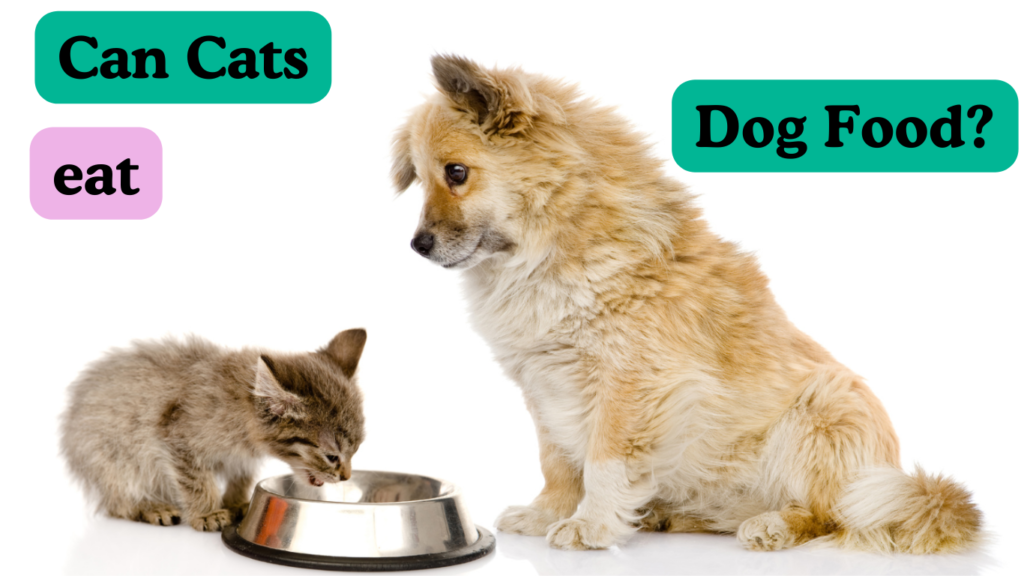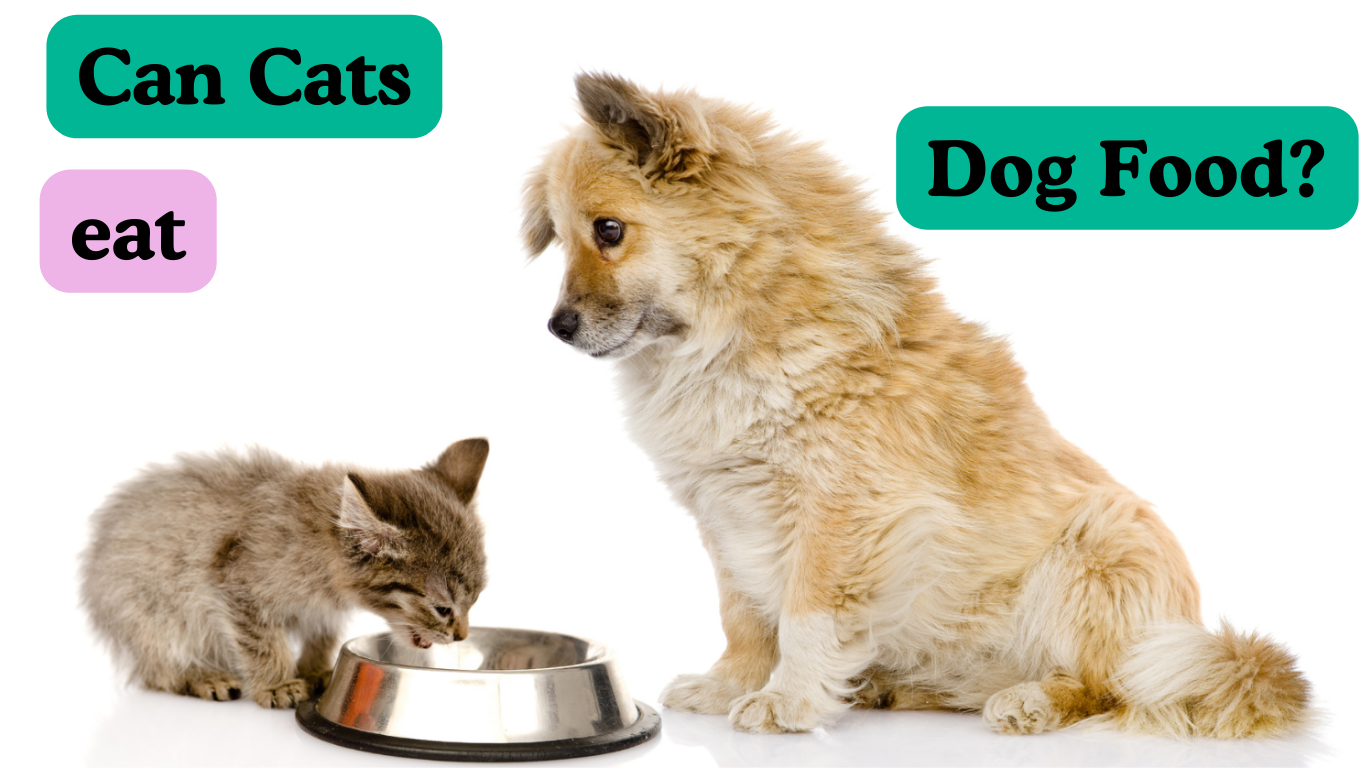Introduction
As responsible cat owners, it’s crucial to understand the nutritional needs of our feline friends and the potential risks associated with feeding them dog food. While it may seem convenient to feed our cats the same food as our dogs, it’s important to recognize that cats have unique dietary requirements that differ from dogs.
In this comprehensive guide, we will delve into how can cats eat dog food and the impact of these foods on cats. We will also explore alternatives to dog food for cats and provide key considerations for cat owners to keep in mind. By the end, we hope to draw a thoughtful conclusion on this important matter.
Table of Contents
Can Cats Eat Dog Food?
- Short answer: Yes, cats can eat dog food in an emergency or for a short period of time, but it is not recommended for their long-term health.
- Detailed explanation: While cats and dogs may seem similar in some ways, they have very different nutritional needs. Cats are obligate carnivores, meaning they require a diet high in animal protein, while dog food is typically formulated for omnivores. This means that dog food may not provide the necessary nutrients for cats, which can lead to health issues.
- Cats also have specific dietary requirements for essential nutrients such as taurine, arachidonic acid, and vitamin A, which may not be present in dog food in the appropriate amounts.
While it may seem convenient to feed your cat dog food, it is not recommended for their long-term health. Cats have unique nutritional needs that are best met with a diet specifically formulated for them. If you have any concerns about your cat’s diet, consult with your veterinarian for personalized recommendations.
Types of Dog Food and their Impact on Cats
Dry Dog Food
Dry dog food, also known as kibble, is a common form of canine nutrition. However, cats have different nutritional needs than dogs and may not thrive on a diet of dry dog food. It is important to choose a diet specifically formulated for cats to ensure their optimal health and well-being.
Wet Dog Food
- Wet dog food has a higher moisture content compared to dry food
- It can supplement a cat’s water intake and prevent dehydration
- It typically has a higher protein and lower carbohydrate content
- Not all wet dog foods are equal, so choose a high-quality brand
It is also important to note that wet dog food should not make up the majority of a cat’s diet. Consult with a veterinarian before incorporating it into a cat’s diet.
If choosing to feed wet dog food to a cat, it should only be given as an occasional treat or supplement to their regular diet. Choose a high-quality brand specifically formulated for cats. In conclusion, while wet dog food may have some benefits for cats, it should not be a regular part of their diet. Consult with a veterinarian first to ensure it is suitable for your cat’s individual needs.
Raw Dog Food
Raw dog food, also known as the BARF (Biologically Appropriate Raw Food) diet, has gained popularity as a natural and healthy option for cats. This diet consists of raw meat, bones, and vegetables, and is believed to mimic the diet of wild cats. While it may provide a natural and biologically appropriate diet for cats, it is important to consider the potential risks and benefits before making the switch.
Alternatives to Dog Food for Cats
Cat-Specific Diets
Cat-specific diets are formulated to meet the unique nutritional needs of felines, providing tailored nutrition to support their health and vitality. These diets are designed with the specific needs of cats in mind, taking into account their natural diet and digestive system.
Benefits of feeding your cat a specialized diet include proper nutrition, weight management, prevention of health issues, improved digestion, and support for specific health conditions. It is essential to consult with a veterinarian before making any changes to your cat’s diet, including homemade cat food, to ensure they are getting the necessary nutrients in the right amounts.
In addition to specialized diets, your veterinarian may also recommend supplements to support your cat’s health. Remember to work closely with your veterinarian to ensure your cat is getting the best nutrition for their individual needs.
Homemade Cat Food
Making homemade cat food can be a healthier and more cost-effective alternative to commercial cat food. It allows cat owners to have control over the ingredients and customize the diet to meet their cat’s specific needs. However, it is important to consult with a veterinarian for professional advice on cat nutrition and to ensure proper food safety guidelines are followed.
Consulting a Veterinarian
Consulting a veterinarian is essential for understanding the dietary alternatives available for cats. They have expert knowledge and can provide individualized recommendations based on your cat’s unique needs.
A veterinarian can also help prevent health issues and guide you in selecting the right food for your cat’s special dietary needs. Remember to regularly consult with a veterinarian for your cat’s overall health and well-being.

Key Considerations for Cat Owners
Understanding Cat Behavior and Appetite
Cats are intriguing animals with their own distinct behaviors and eating habits. As a cat parent, it’s crucial to comprehend these innate tendencies to properly care for your furry companion. In this section, we will delve into the important factors for cat owners to understand their cat’s behavior and appetite, including their dietary needs and preferences.
Reading Pet Food Labels
Understanding pet food labels is crucial for determining the suitability of different pet food products for cats. It allows cat owners to evaluate the nutritional value and make informed decisions. When selecting food for your cat, consider the protein sources, healthy fats, and specific vitamins and minerals. Avoid artificial ingredients and introduce diet changes gradually to prevent digestive issues. If you have any concerns about your cat’s diet, consult with your veterinarian.
Transitioning Diets Safely
When it comes to transitioning your cat to a new diet, it’s important to do it gradually to minimize digestive issues and ensure they adapt well to the changes. This is crucial for maintaining their overall well-being. Here are some key considerations to keep in mind:
- Start Slowly: Cats are creatures of habit and sudden changes in their diet can cause digestive upset. To avoid this, introduce the new food slowly by mixing it with their current food in increasing amounts over the course of 7-10 days.
- Observe Your Cat’s Reaction: During the transition period, keep a close eye on your cat’s behavior and appetite. If you notice any changes or concerns, consult with your veterinarian.
- Stick to the Recommended Portions: It’s important to stick to the recommended portions to avoid overfeeding and potential weight gain.
Conclusion
In conclusion, it’s important for cat owners to carefully consider their feline’s unique nutritional needs and the composition of dog food when deciding whether cats can eat dog food?. While cats have specific dietary requirements that differ from dogs, it’s crucial to seek expert guidance and do further research to ensure our furry companions are getting a balanced and tailored diet that aligns with their specific nutritional needs.

